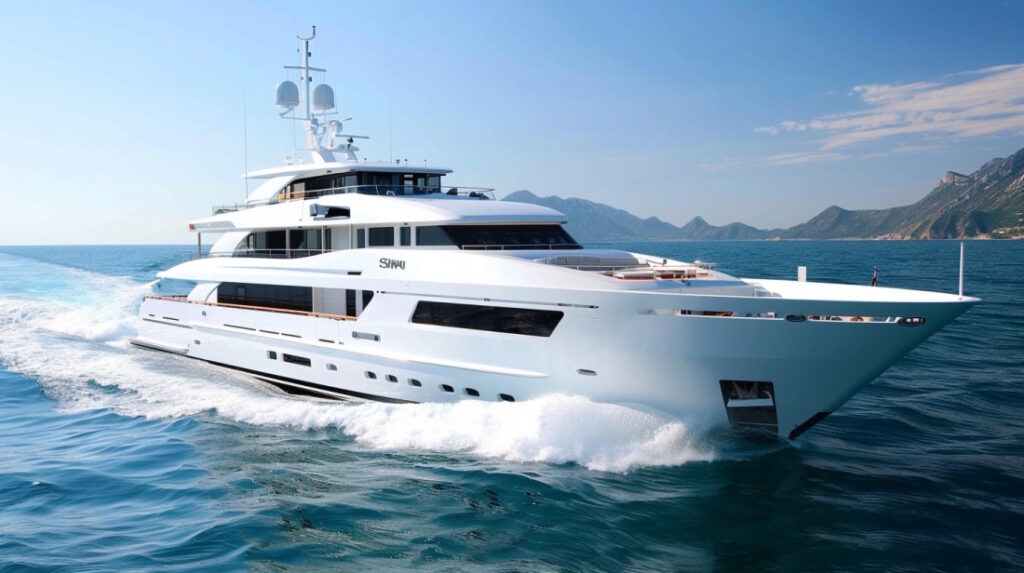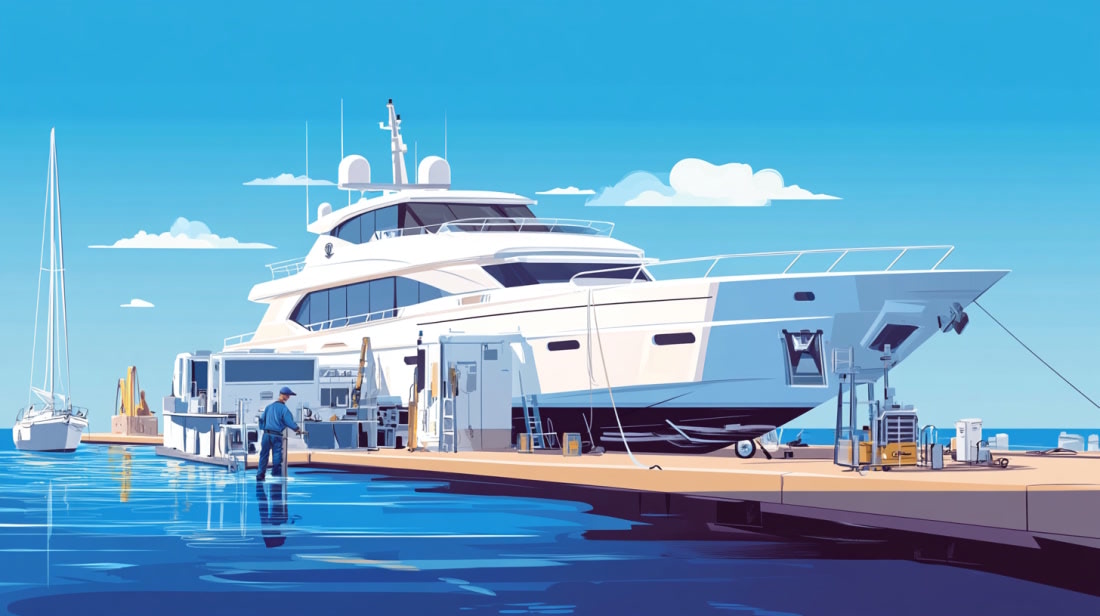Understanding your yacht’s fuel consumption is crucial for efficient operation and cost management. By monitoring and analyzing your fuel usage, you can identify patterns and make adjustments to optimize efficiency. Factors such as speed, engine load, and sea conditions can all impact fuel consumption. Keep records and use fuel monitoring systems to get insights about your yacht’s performance and make informed choices to use less fuel. Understanding your yacht’s engines and systems fuel requirements will help you choose the right fuel and ensure proper maintenance.
Furthermore, understanding the relationship between speed and fuel consumption is essential. Going faster uses more fuel. Finding the best speed for your yacht can save fuel. You can use GPS and onboard computers to monitor your yacht’s fuel efficiency in real-time and make adjustments if needed. It’s important to understand how weather and sea conditions affect fuel consumption, so you can plan routes and adjust your sailing strategy to use less fuel. Overall, a comprehensive understanding of your yacht’s fuel consumption is essential for efficient operation and cost-effective management.
Key Takeaways
- Understanding your yacht’s fuel consumption is crucial for efficient operation and cost savings.
- Proper maintenance and upkeep of your yacht’s engine and systems can significantly impact fuel efficiency.
- Efficient navigation and route planning can help minimize fuel consumption and optimize your yacht’s performance.
- Consider alternative fuel options such as biodiesel or hybrid systems to reduce environmental impact and fuel costs.
- Implementing energy-saving technology like LED lighting and solar panels can help reduce fuel consumption and reliance on traditional power sources.
- Reduce weight and drag by decluttering and optimizing your yacht’s design to improve fuel efficiency.
- Educating and training your crew on fuel-efficient practices and techniques can help maximize your yacht’s performance and minimize fuel consumption.
Proper Maintenance and Upkeep
Proper maintenance and upkeep of your yacht’s engines and systems are essential for optimizing fuel efficiency. Regular servicing and inspections can help identify and address any issues that may be impacting fuel consumption. Keeping the engines clean and well-maintained, including regular oil changes and filter replacements, can improve performance and reduce fuel usage. Additionally, ensuring that all systems are properly calibrated and functioning optimally can help minimize fuel waste.
Furthermore, proper hull maintenance is crucial for reducing drag and improving fuel efficiency. Regular cleaning and antifouling treatments can prevent the build-up of marine growth, which can increase drag and fuel consumption. Properly maintaining propellers and shafts can also contribute to improved fuel efficiency. Make sure your yacht’s hull is well-designed and maintained to improve hydrodynamics and save fuel.
Taking care of the engine and hull is important, but maintaining other systems like air conditioning, refrigeration, and electrical systems can also affect fuel usage. Ensuring that these systems are properly maintained and operating efficiently can help reduce overall energy usage and improve fuel efficiency. Overall, proper maintenance and upkeep of your yacht’s engines, systems, and hull are essential for optimizing fuel efficiency.

Efficient Navigation and Route Planning
Efficient navigation and route planning are key factors in reducing fuel consumption on your yacht. You can reduce your fuel consumption by planning your sailing routes carefully, taking into account factors like currents, wind patterns, and sea conditions. Using modern navigation tools like GPS, radar, and electronic charts can help you find the best routes and avoid unnecessary detours or going back.
Understanding currents and wind patterns can help you make better choices to save fuel. To save on fuel, use favorable currents and winds to reduce engine power needs. Additionally, planning your routes to avoid areas with strong opposing currents or headwinds can further improve fuel efficiency.
Besides planning the route, efficient navigation techniques like maintaining a constant speed, avoiding unnecessary maneuvers, and optimizing sail trim can help reduce fuel consumption. By carefully managing your yacht’s speed and course, you can minimize energy waste and improve overall fuel efficiency. Overall, efficient navigation and route planning are essential for reducing fuel consumption on your yacht.
Consider Alternative Fuel Options
Considering alternative fuel options is a proactive approach to reducing your yacht’s environmental impact and operating costs. Biodiesel, ethanol blends, and hydrogen fuel cells can potentially lower emissions and fuel costs. By exploring these options, you can make informed decisions about the most suitable alternative fuels for your yacht.
Furthermore, alternative fuels may offer additional benefits such as improved engine performance or reduced maintenance requirements. Test and research alternative fuels to find the best options for your yacht’s engines and systems. Also, it’s important to consider where you can find alternative fuels at different ports and marinas along your sailing routes.
Aside from alternative fuels, using energy-efficient propulsion systems like electric or hybrid propulsion can also help reduce fuel consumption. By adding these technologies to your yacht’s propulsion system, you can decrease the use of traditional fossil fuels and lessen the impact on the environment. Overall, considering alternative fuel options is a proactive approach to reducing fuel consumption on your yacht.
Implementing Energy-Saving Technology
Implementing energy-saving technology on your yacht can significantly reduce fuel consumption and operating costs. Upgrading to modern, energy-efficient engines and systems can offer substantial improvements in fuel efficiency. Newer engine technologies such as direct injection or variable valve timing can improve combustion efficiency and reduce fuel consumption. Additionally, integrating energy-saving features such as LED lighting, energy-efficient appliances, and solar panels can further minimize energy usage on board.
Furthermore, utilizing advanced energy management systems can help optimize energy usage on your yacht. These systems can monitor and control energy consumption throughout the vessel, ensuring that power is used efficiently and minimizing waste. Using renewable energy sources like wind or solar power on your yacht can help reduce the need for traditional fuels.
In addition to onboard technology, utilizing shore power or alternative energy sources at marinas can also contribute to reduced fuel consumption. By taking advantage of shore power hookups or renewable energy sources available at marinas, you can minimize the need to run onboard generators or engines for power generation. Overall, implementing energy-saving technology on your yacht is a proactive approach to reducing fuel consumption and environmental impact.
Reduce Weight and Drag

Reducing weight and drag on your yacht is essential for optimizing fuel efficiency. By minimizing unnecessary weight on board through careful provisioning and storage practices, you can reduce the energy required to propel the vessel. Additionally, optimizing the distribution of weight on board can improve stability and reduce resistance in the water, further improving fuel economy.
Furthermore, reducing drag through hull design modifications or the use of advanced coatings can significantly improve fuel efficiency. By ensuring that your yacht’s hull is clean and free from marine growth, you can minimize drag and reduce the energy required to propel the vessel through the water. Additionally, utilizing advanced hull coatings or designs that reduce friction can further improve overall fuel economy.
In addition to weight and drag reduction measures, optimizing sail trim and rigging settings can also contribute to improved fuel efficiency. By maximizing the use of wind power through efficient sail handling techniques, you can reduce reliance on engine power and minimize fuel consumption. Overall, reducing weight and drag on your yacht is essential for optimizing fuel efficiency.
Educating and Training Your Crew
Educating and training your crew on best practices for fuel-efficient operation is essential for achieving optimal performance. By providing comprehensive training on efficient navigation techniques, proper sail trim, and energy-saving technology use, you can empower your crew to contribute to reduced fuel consumption. Additionally, fostering a culture of environmental awareness and responsible energy usage among your crew members can further promote sustainable operation.
Furthermore, providing ongoing education on the specific fuel requirements of your yacht’s engines and systems can help ensure that all crew members understand how their actions impact overall fuel consumption. By promoting a proactive approach to maintenance and upkeep among your crew members, you can minimize energy waste and maximize fuel efficiency.
In addition to formal training programs, encouraging open communication among crew members regarding ideas for improving fuel efficiency can foster a collaborative approach to reducing energy usage on board. By creating a culture of continuous improvement and innovation, you can harness the collective knowledge and experience of your crew to identify new opportunities for optimizing fuel consumption. Overall, educating and training your crew on best practices for fuel-efficient operation is essential for achieving optimal performance on your yacht.
Looking to enhance your yacht’s fuel efficiency? Check out our article on fashioning canvas covers for your boat to protect your vessel from the elements and reduce drag, ultimately improving fuel economy. Additionally, maintaining your boat’s upholstery is crucial for both aesthetics and performance. Learn more about marine upholstery in Cocoa Beach and discover how to repair cracked vinyl boat seats in our related articles.
FAQs
What are some tips for improving fuel efficiency on a yacht?
Some tips for improving fuel efficiency on a yacht include maintaining a clean hull, reducing weight on board, using the most efficient cruising speed, and regular engine maintenance.
How does maintaining a clean hull improve fuel efficiency?
A clean hull reduces drag and allows the yacht to move through the water more efficiently, ultimately reducing fuel consumption.
Why is reducing weight on board important for fuel efficiency?
Reducing weight on board can improve fuel efficiency by decreasing the amount of power needed to propel the yacht through the water.
How does using the most efficient cruising speed improve fuel efficiency?
Using the most efficient cruising speed can optimize fuel consumption by finding the speed at which the yacht achieves the best fuel economy.
Why is regular engine maintenance important for fuel efficiency?
Regular engine maintenance ensures that the yacht’s engines are running at their most efficient, reducing fuel consumption and extending the life of the engines.





